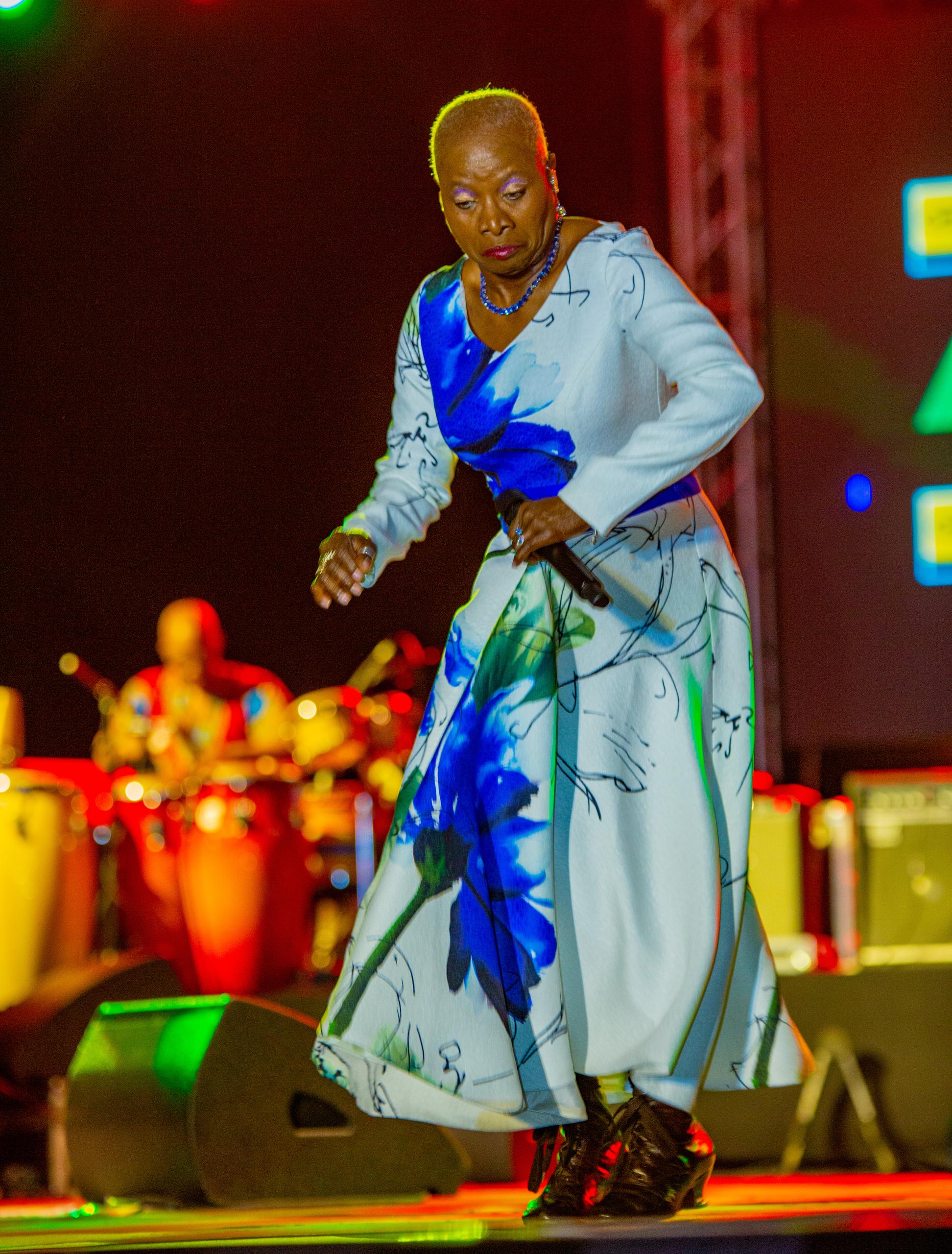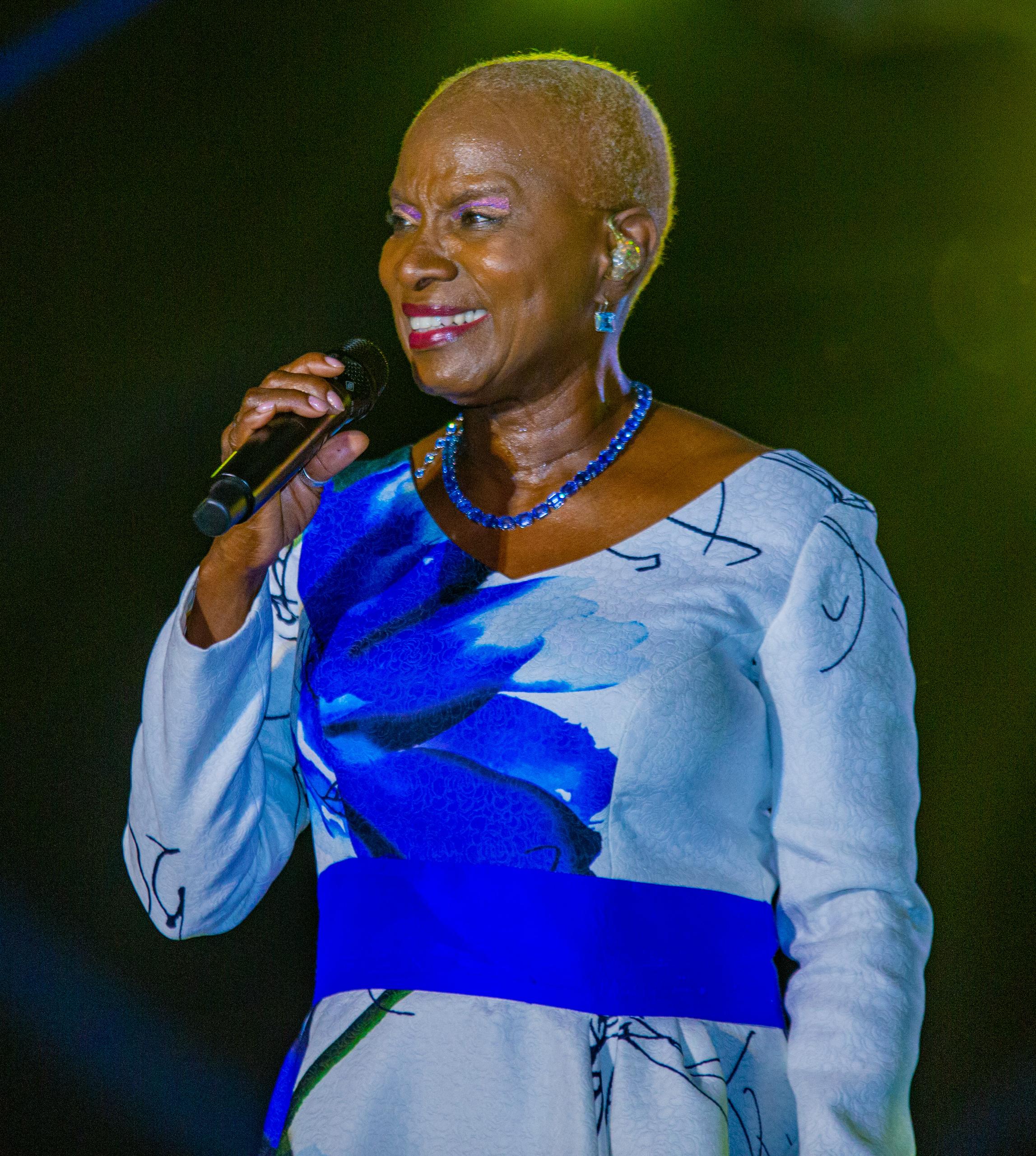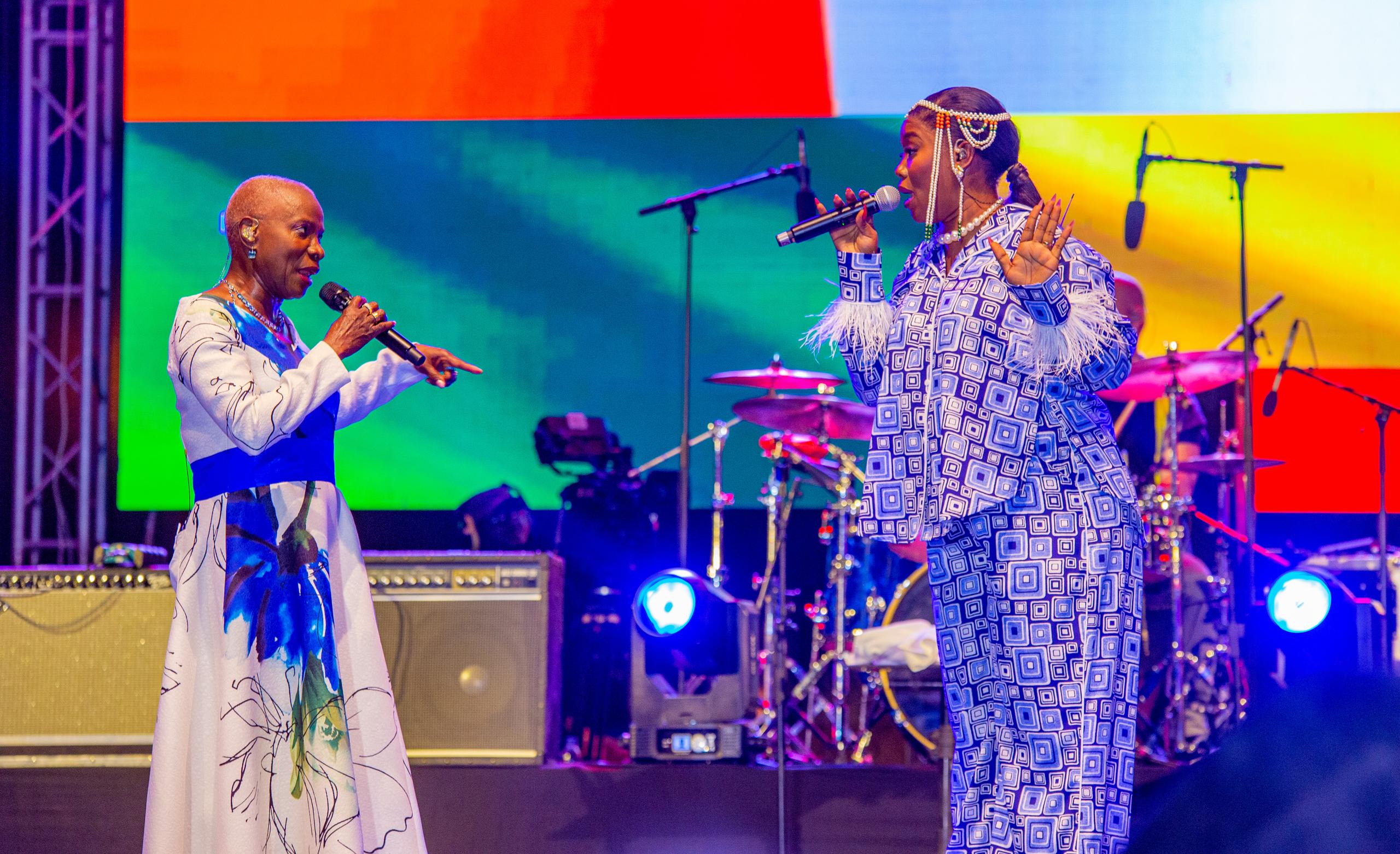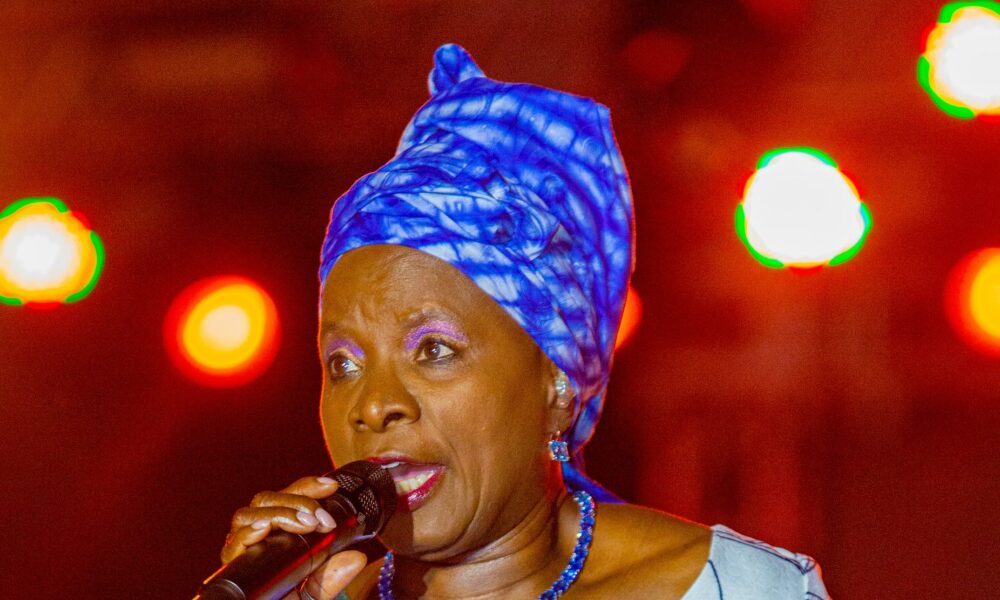A boy waved a large glove painted in the colours of the Ivorian flag at Angélique Kidjo as she performed her song “Afrika.” This song evokes deep appreciation for the continent and highlights Africa’s attributes. The crowd sang along, chanting, “Ashè é maman, ashè é maman Afirika.” Angélique dazzled in her gown adorned with blue and green floral designs, blue pearls ornamented her neck and ears. A diva; she moved gracefully, just as energetically as she did in the previous performances I had watched online, showing no signs of her age. Three years ago, she delivered the same song at the Global Citizen concert in Paris, showcasing the same poise and flawless artistry that captivated the audience.
The boy, like me, was watching Angélique perform live for the first time in his life, but it was not the first time I’d seen her.
The day before, we were sitting in the hotel lounge when the 64-year-old African music legend appeared before us, rising out from a staircase leading into the boardroom where the press conference was being held. I was scheduled to meet with her in 5 minutes. She appeared so simple and so human, as though she were not the Angélique Kidjo, who is considered by many to be the beacon of African music and who, for many decades, has used her creativity and personality to shape some perceptions of Africa. In 2007, she was named “Africa’s premier diva” by Time.
She arrived in Abidjan, Côte d’Ivoire, to perform at the 17th edition of the Anoumabo Urban Music Festival, known in French as the Festival des Musiques Urbaines d’Anoumabo (FEMUA), an annual international music festival launched by the Magic System, an Ivorian music group led by Salif Traoré, popularly known as A’salfo, who was born in Anoumabo.
I joined Angélique Kidjo some minutes after she returned to the boardroom, taking rapid strides in her simple outfit, defying the toll the day had taken on her: She had woken up before 6 a.m. to energise her body in the gym. From there, it was one event to the other, and just on that day, she spoke to about 10 journalists, each spending more than 15 minutes, sitting down and answering questions as we each took turns in the boardroom. I was the last journalist to speak to her, but the tiredness never appeared on her face. I was worried she wouldn’t have the energy to hold a conversation, so I asked her, in Yoruba, as one of the many languages she’s fluent in, “Shey koti rera, ma?” Loose translation: Are you not tired in the body, ma?
“Oh, I am, but I am used to it,” she told me. “Iwo nko?” She asked how I was feeling. I was fine and excited to speak to her, I said.
“I started music pretty young. The first time I went on stage, I was 6 years old. I love singing, and that singing has been nurtured by my family. Every time I went on vacation with my family in Lagos, there were always songs. Every time I visited my father’s family, there was always music. I absorbed and learned early and pretty fast.”
To many Nigerians, Angélique Kidjo exists almost like a mystical legend. The majority of young people, like me, were introduced to her properly in 2020 when Burna Boy’s “African Giant” was nominated for Best Global Music Album at the Grammys. Many Nigerians, probably due to their fanaticism or–to be a little bit extreme–superiority complex, expect their faves to win any category they appear in. When Angélique Kidjo was announced as the winner, marking her 4th Grammy Award, she dedicated the award to Burna Boy, a symbol of the legend that she is, using the moment to nudge a sense of pan-Africanism.

Photo Credit: Tidiane Traore/FEMUA
Consuming a lot of diverse music from the African continent, alongside music from the likes of James Brown and Stevie Wonder, from a young age inspired her to make conscious music. There and then, she realised she could go anywhere and sing, even if they didn’t understand her language. She said to herself, “I know my music will take me everywhere. And that’s what brought me where I am today.” There are no words to describe how much Angélique has achieved, from albums to awards to performances in arenas, she has surely achieved the dream of that 6-year-old girl.
Every FEMUA edition since its launch in 2008 has always been themed. The 17th FEMUA is themed “Road Safety”, to create awareness towards one of the causes of death in Côte d’Ivoire. The daily number of fatal road accidents in the country has risen to 46, from just 12 in 2012, according to a 2023 United Nations report. The report further says that “in Africa, traffic deaths account for about one quarter of the global number of victims, even though the continent has barely 2 per cent of the world’s vehicle fleet,” albeit the absence of proper data documentation in the continent.
It was only fitting for Angélique Kidjo, who has been involved in several causes, to perform at the FEMUA. Beyond her generational and genre-defying music, Angélique Kidjo has built a reputation as one of Africa’s most vocal voices for social justice, girls’ education and cultural pride. Through her Batonga Foundation, she supports the education and empowerment of young girls in underserved communities across sub-Saharan Africa. As a UNICEF Goodwill Ambassador, she has consistently spoken out against child exploitation, gender-based violence and health crises like HIV/AIDS.
“One thing that we cannot forget is that our culture comes from the transmission of storytelling. Your grandmother told tales to you, right? That’s where our power is. Music is a powerful tool [for remembrance]. Every ceremony has a song to mark the moment. Telling a story is a compelling thing, and FEMUA is a free event where we can tell people to be careful when they drive. Music has that power; it is what I have used to address issues my continent faces. This is why I am happy to be here this year, unlike other years when my calendar never allowed me.”
Her music, itself, has been a vehicle for advocacy. Songs like “Batonga” and “Afrika” reaffirm African identity and resist cultural erasure, while her Grammy-winning reinterpretation of Talking Heads’ “Remain in Light” tackles issues like xenophobia and migration.
“Knowing where you come from, being proud of your own culture and the fact that you have something to offer, that is enough.”

Photo Credit: Tidiane Traore/FEMUA
For decades, Angélique Kidjo has made songs that transcend and inspire generations. As an African woman, I asked her how proud she is of the latest generation of African women taking music globally, considering the systemic discrimination that women face in every industry. She reflected on some discrimination in her early stages. In France, “every time I opened my mouth, they’d say, “No, this is not African music. You think everything comes from Africa?” I mean, I’ve been through verbal abuse so many times, but I keep [to] my goal,” she said.
“My first album, ‘Logozo,’ it was a nightmare before we started the full [performing] session. A stylist told me, “Why do you need a stylist? In your country, don’t you walk naked?” I had to go out and find my own outfit. It was the beginning for a moment of reckoning that made me realise it wasn’t the first time I’d face it. SobI’d better be prepared. I was like, one day, I’m gonna prove to you all. Because I know where I come from.”
While Angélique Kidjo is proud of the female African artists, she emphasised the power of purpose and working together. “It’s harder for women because more male artists out there, so work together. Solidarity is what has kept us through the years, so let’s continue doing it.” While performing, she brought out Roseline Layo, a young Ivorian female artist, to perform their newly released song, “On Sera Là.”

Photo Credit: Tidiane Traore/FEMUA
One of the goals of FEMUA is to introduce the Ivorian culture to the world, through food, dance and music. The presence of international media allows the festival to be a channel for cultural exportation and tourism promotion. I asked Angélique Kidjo if she thinks collaboration between African artists could help in exporting the continent’s cultures.
“United, we’re unbreakable. Divided, we’d fail. And I want the young generation to know that. It’s not always about money or flashy stuff; it’s about what we’re building and leaving for the coming generation. We have to be purposeful about that, and the more we collaborate, the more we create a ripple effect,” said Angélique Kidjo. Her 2021 album, Mother Nature, has a lot of collaborations with many young African artists like Burna Boy, Yemi Alade, Mr Eazi, Sampa The Great, and Shungudzo, among others.
The time was 7:20 pm, and she had to be somewhere else. As the conversation drew to a close, I asked her, What is that advice she’d give to every African artist, young or old, out there? It’s the same thing she’s always reiterated. “The only thing that I have is the music of my ancestors, and I want the new generation to be mindful of how they carry themselves out there because these people are always ready to deceive us. I have built something because I didn’t give up. Don’t give up on me.”
Crédito: Link de origem


